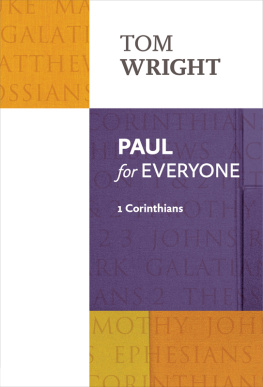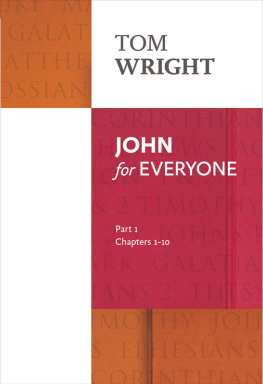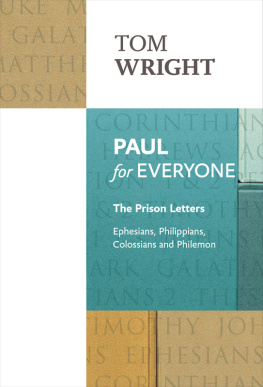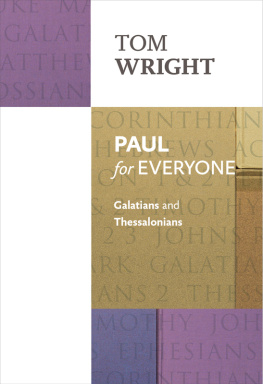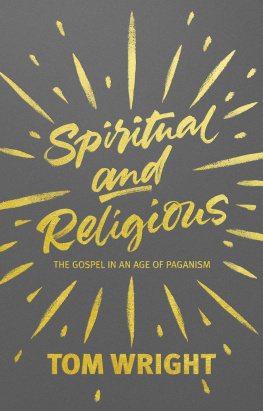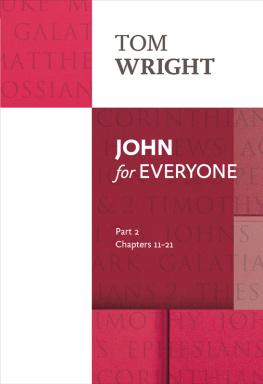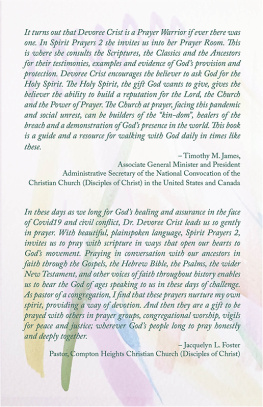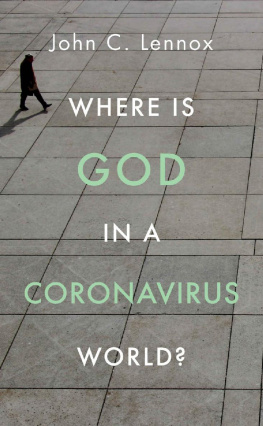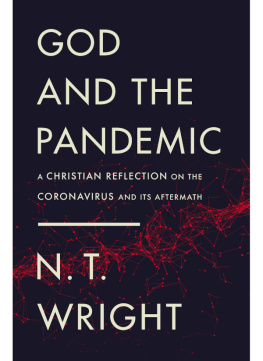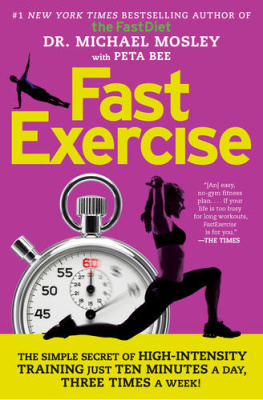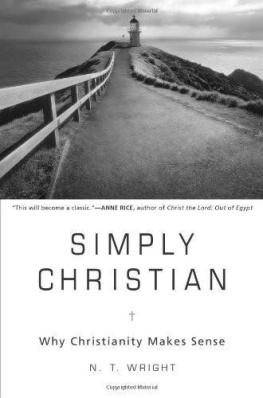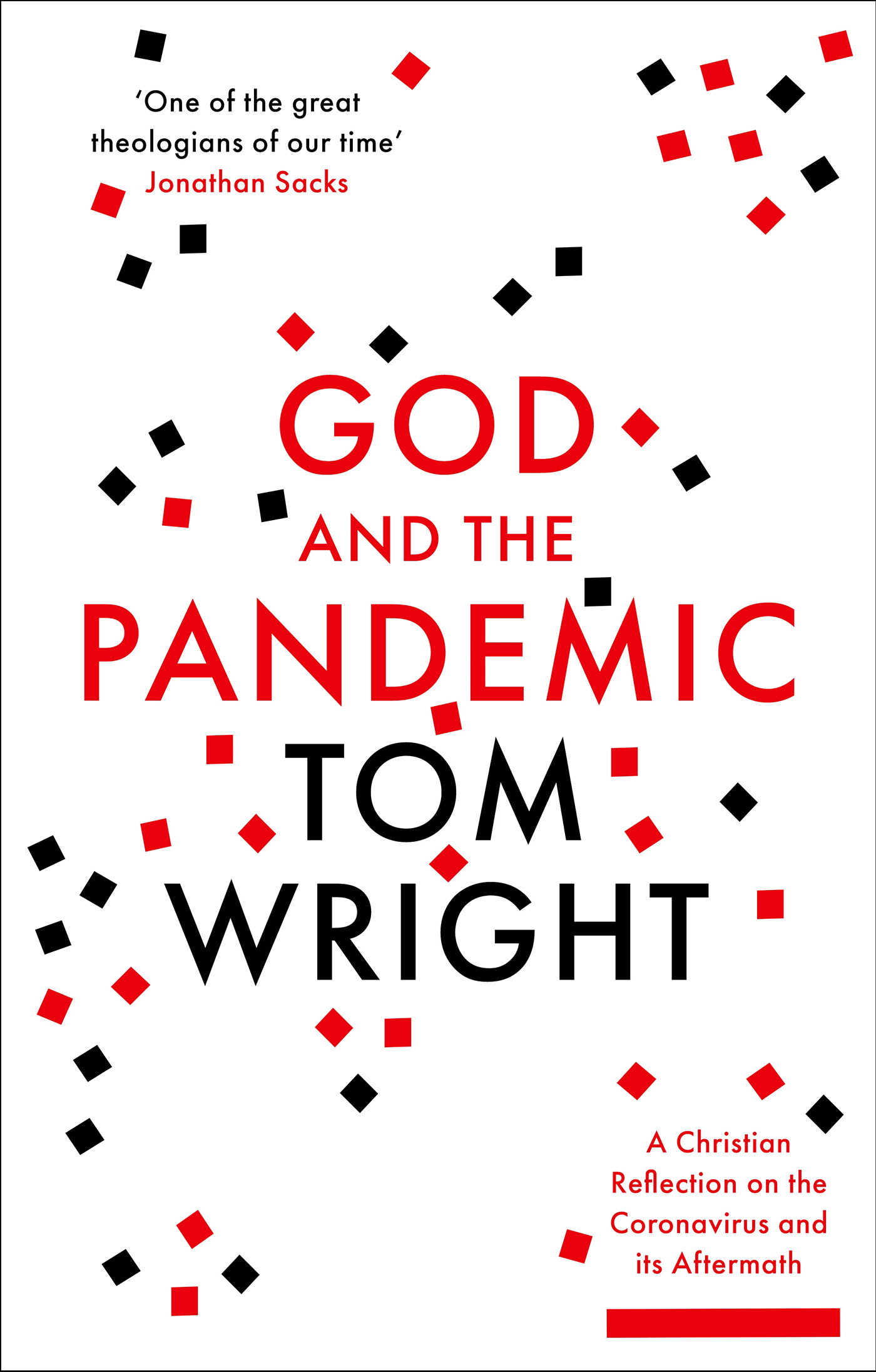Tom Wright is Research Professor of New Testament and Early Christianity at the University of St Andrews and Senior Research Fellow at Wycliffe Hall, Oxford. Prior to that he was Bishop of Durham (2003-10), Canon Theologian of Westminster (20003), Dean of Lichfield (199499) and Fellow, Tutor and Chaplain of Worcester College, Oxford (198693).
Professor Wright is the author of over eighty books, including The New Testament and the People of God (1992), Jesus and the Victory of God (1994), The Resurrection of the Son of God (2003), Scripture and the Authority of God (2005), S urprised by Hope (2007), Virtue Reborn (2010), How God Became King (2012), Paul and the Faithfulness of God (2013), The Day the Revolution Began (2016), Paul: A biography (2018) and (with Michael F. Bird) The New Testament in its World (2019).
First published in Great Britain in 2020
Society for Promoting Christian Knowledge
36 Causton Street
London SW1P 4ST
www.spck.org.uk
Copyright Tom Wright 2020
All rights reserved. No part of this book may be reproduced or transmitted in any form or by any means, electronic or mechanical, including photocopying, recording, or by any information storage and retrieval system, without permission in writing from the publisher.
SPCK does not necessarily endorse the individual views contained in its publications.
Old Testament quotations are from the New Revised Standard Version of the Bible, copyright 1989 by the Division of Christian Education of the National Council of the Churches of Christ in the USA. Used by permission. All rights reserved. New Testament quotations are from the authors own translation: The New Testament for Everyone (SPCK, 2011,2019).
Extract from East Coker by T. S. Eliot, in Four Quartets . London: Faber & Faber, 2001 [1979]; Orlando, FL: Harcourt, 1943. Copyright UK, Faber & Faber; USA, Houghton Mifflin Harcourt. Reprinted with permission from Faber & Faber and Houghton Mifflin Harcourt.
British Library Cataloguing-in-Publication Data
A catalogue record for this book is available from the British Library
ISBN 9780281085118
eBook ISBN 9780281085125
1 3 5 7 9 10 8 6 4 2
Typeset by The Book Guild Ltd, Leicester
First printed in Great Britain by Ashford Colour Press
eBook by The Book Guild Ltd, Leicester
In memory of Simon Barrington-Ward KCMG
A wise and gentle saint
Bishop of Coventry 19851997
Died of Covid-19, Holy Saturday, April 11, 2020
Contents
Publishers note
During this time of global emergency, we are contributing any profits from this book to the following initiatives.
Free Pause for Thought ideas for parents and children to use at home:
< www.assemblies.org.uk >
Free daily bedtime story videos, with printable worksheets:
< www.spckpublishing.co.uk/faith-at-home >
Free ebooks from a selection of SPCK authors:
< www.spckpublishing.co.uk/free-ebooks >
Colouring-in downloads of material from SPCK books:
< www.spckpublishing.co.uk/colouring-sheets >
We have also arranged extensive reprints of all the books in our Diffusion Prison Fiction reading scheme to match a huge rise in demand from prisons, where most prisoners are locked in their cells for 23 hours a day.
Preface and acknowledgements
This little book would not have been written had it not been for the invitation from TIME Magazine to write a short piece, early on in the Covid -19 pandemic. My thanks to Belinda Luscombe for commissioning and editing that piece, and to the many who wrote to me afterwards, mostly to thank me, some to rebuke me. The present discussion is a further attempt to tease out what may wisely and biblically be said at such a time as this. As the weeks of lockdown have gone on, I, like I suppose most people, have gone through a range of emotions about it all; but it seems to me important to keep our reactions within a biblical limit, and this is what Im trying to do here.
The aim of this book, then, is not to offer solutions to the questions raised by the pandemic, to give any sort of complete analysis of what we might learn from it, or what we ought now to do. My main argument is precisely that we need to resist the knee-jerk reactions that come so readily to mind. Before we can answer those questions in anything other than the broadest outline, we need a time of lament, of restraint, of precisely not jumping to solutions. These may come, God willing, but unless we retreat from our instant reactions we may not be able to hear them. If we spend time in the prayer of lament, new light may come, rather than simply the repetition of things we might have wanted to say anyway.
I am very grateful to Philip Law and his colleagues at SPCK for their willingness to take this project on at short notice, and to the old friends who have read drafts and made comments, some quite trenchant. I think particularly of Michael Lloyd, Brian Walsh, Carey Newman, Simon Kingston, Peter Rodgers and James Ernest; and also my daughter Hattie. They are not, of course, responsible for anything that I have said. Nor is my beloved wife Maggie, whose enjoyment of the original TIME article provided me with encouragement to press ahead but didnt stop her from giving me pointed critique of successive drafts.
Tom Wright
Wycliffe Hall, Oxford
April 2020
1
Where do we start?
It sounds like one of those Greek irregular verbs: panic, pandemic, pangolin, pandemonium . Instead, it turns out to be an irregular virus. Wed had them before (SARS and even Mad Cow Disease). They were worrying for a time, but we got over them. Gloomy forecasts of millions of deaths turned out to be exaggerated. Surely this one would be the same?
I was reminded of the ironic quote from Pastor Martin Niemller. There are several versions of what he may have said, but the point is the same. Speaking about 1930s Germany, he said:
First they came for the Jews; but I did nothing because I am not a Jew. Then they came for the socialists, but I did nothing because I am not a socialist. Then they came for the Catholics, but I did nothing because I am not a Catholic. Finally, they came for me, but by then there was no-one left to help me.
So it has been, I thought, with the British and American reaction to the coronavirus. First it hit the Chinese, but we arent Chinese, and anyway China is far away and strange things (like eating pangolins) happen there. Then it hit Iran, but we didnt worry because Iran, too, is far away, and anyway its such a very different place. Then it struck Italy, but we thought, Well, the Italians are sociable, tactile people, of course it will spread there, but well be all right. And then it arrived in London. And New York... And suddenly there was no safe space on the planet.
There is no neutral zone. No medical equivalent of wartime Switzerland, where you could escape for a while, relax, and ponder what ought to be done.
So does anybody know whats going on? Why is this happening? Is someone trying to tell us something? What are we supposed to do about it?
In most of the ancient world, and many parts of the modern world too, major disasters (earthquakes, volcanoes, fires, plagues) are regularly associated with angry gods. Something bad has happened? Must be because someone has it in for you. In the old pagan world of Greece and Rome, the assumption was that you hadnt offered the right sacrifices; or you hadnt said the right prayers; or you did something so truly dreadful that even the old amoral gods on Mount Olympus felt it was time to crack down on you.


